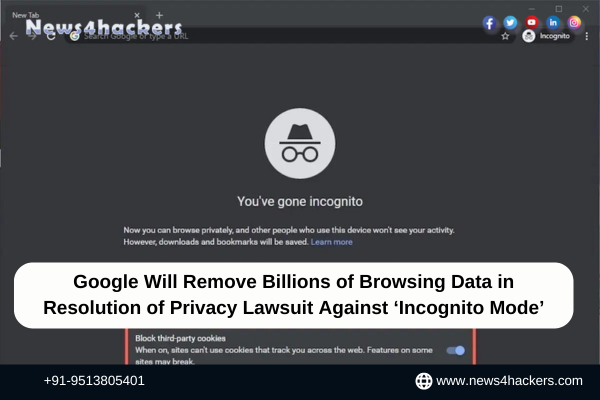Google Will Remove Billions of Browsing Data in Resolution of Privacy Lawsuit Against ‘Incognito Mode’

Google Will Remove Billions of Browsing Data in Resolution of Privacy Lawsuit Against ‘Incognito Mode’
In a historical verdict from a US Court, Google Will Remove Billions of Browsing Data in a Resolution of Privacy Lawsuit Against ‘Incognito Mode.’

A class action lawsuit has reached a settlement with Google whereby the search behemoth pledges to delete billions of data records containing users’ browsing activities. The suit claimed that Google had secretly tracked the users through its Chrome browser without their consent or knowledge.
The class action lawsuit, which was initiated in 2020, claimed that the company deceived users by monitoring their online activities while they believed it was private when they utilized “private” or “incognito” modes on web browsers such as Chrome.

It came to light towards the end of December 2023 that the organization had agreed to a settlement regarding the litigation. At this time, the agreement is awaiting U.S. District Judge Yvonne Gonzalez Rogers’s approval.
A court filing dated April 1, 2024, stated, “The settlement offers broad relief irrespective of the difficulties presented by Google’s restricted record keeping.”

“A lot of the private browsing data in these logs will be erased in their whole, such as billions of event-level data entries that represent class members’ private browsing activities.”
In order to comply with the data remediation process, Google must eliminate any information that could be used to identify private browsing data. This can be achieved through various measures such as redacting data points like IP addresses and User-Agent strings, generalizing them, and removing specific URLs associated with visited websites (retaining only domain-level portions of the URLs).

Furthermore, it has been requested that the X-Client-Data header field be removed. Google defines this header as part of the Chrome-Variations package, which records “the current status of the Chrome installation, including active variations and server-side experiments that could potentially impact the installation.”
The generation of this header commences with a randomized seed value, thereby imparting it the potential to discern particular Chrome users.
Additional settlement provisions mandate that Google disable third-party cookies for a duration of five years while using Chrome’s Incognito Mode; this feature has already been deployed by the company for all users. A distinct initiative by the technology company is to automatically remove monitoring cookies by the conclusion of the current year.

Since January 2024, Google has added clarification to the wording of Incognito Mode, stating that it will not affect “the manner in which data is gathered by the websites you visit and the services they employ, including Google.”
The lawsuit obtained statements of admission from Google employees wherein they described the Incognito browsing mode of the browser as a “message of confusion,” “virtually a fabrication,” and a “concern of fundamental integrity and professional ethics.”

Additionally, it disclosed internal communications wherein executives debated whether Incognito Mode ought to be referred to as “private” or whether it could “exacerbate known misconceptions.”
In an effort to reduce spam and phishing attacks, Google has begun automatically blocking mass senders in Gmail that do not comply with its email sender guidelines. This development coincides with the announcement that Google has begun doing so.

Email senders who transmit in excess of 5,000 messages daily to Gmail accounts are now obligated to include a one-click unsubscribe feature and provide a response to unsubscribe requests within a period of two days.
About The Author:
Yogesh Naager is a content marketer who specializes in the cybersecurity and B2B space. Besides writing for the News4Hackers blog, he’s also written for brands including CollegeDunia, Utsav Fashion, and NASSCOM. Naager entered the field of content in an unusual way. He began his career as an insurance sales executive, where he developed an interest in simplifying difficult concepts. He also combines this interest with a love of narrative, which makes him a good writer in the cybersecurity field. In the bottom line, he frequently writes for Craw Security.
READ MORE ARTICLE HERE






